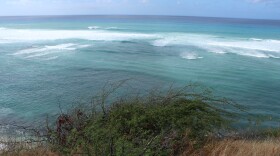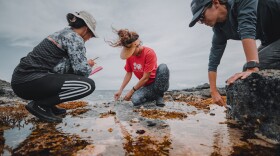-
HPR spoke with University of Hawaiʻi climate scientist Matthew Widlansky about a new A.I. tool his team developed to help his fellow scientists explore complex data.
-
Acidification was thought to be worst at the ocean's surface. A new study shows that some deeper waters may be acidifying more quickly than shallow waters.
-
USGS geophysicist Ashton Flinders spoke with HPR’s Maddie Bender about his expedition aboard the Office of Naval Research’s Research Vessel (R/V) Atlantis.
-
Chip Fletcher, Chloe Obara and Shellie Habel studied sea level rise and flood threats in Waikīkī. They spoke with The Conversation's Catherine Cruz about Waikīkī's storm drain system.
-
The Trump administration has proposed budget cuts to NOAA that could close a research station on Maunaloa. That site has been a key source of information on climate change for decades. HPR's Savannah Harriman-Pote spoke to researchers with ties to the station.
-
A judge has ruled against allowing commercial fishing in the Pacific Islands Heritage Marine National Monument; A free seminar helps couples navigate divorce
-
University Hawaiʻi planetary geophysics researcher Matt Siegler spoke with HPR’s Maddie Bender about being selected to develop an instrument for a NASA Lunar Terrain Vehicle.
-
Sacred Hearts School principal Tonato Lolesio talks about plans to set up classrooms in temporary facilities while rebuilding their campus, which was destroyed in the Lahaina fire; Hawaiʻi County Council Member Matt Kanealiʻi-Kleinfelder and Elaine Parlow from Action 4 Animals discuss a divisive measure that would prohibit the feeding of stray or feral animals on county property
-
Local film industry professionals form the Hawaiʻi Film Alliance; NPR "Short Wave" co-hosts Emily Kwong and Regina Barber dive into the ocean in a new series called "Sea Camp"
-
A local hub for climate research is facing an uncertain future. As HPR's Savannah Harriman-Pote reports, time is ticking for them to receive crucial federal funding.
Play Live Radio
Next Up:
0:00
0:00
Available On Air Stations










